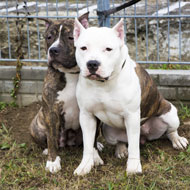
Law Commission project could lead to legislation change
Breed specific legislation (BSL), which effectively bans four types of dog in the UK, is being considered by the Law Commission as part of a project that could lead to changes in the law.
The commission is a statutory independent body that aims to ensure the law is fair, modern, simple and cost effective. Last year it launched a consultation on laws that are in need of reform.
BSL was proposed by the RSPCA and has this week been selected for further consideration. A final list of projects is set to be revealed in May.
The legislation, which bans the pit bull terrier, Japanese tosa, fila Braziliero and dogo Argentino, has been broadly criticised by animal welfare charities, canine behaviourists, veterinary professionals and members of the public.
Twenty-five years after the law was introduced, critics say it has done nothing to improve public safety and creates animal welfare issues. Over the past year a number of charities have spoken out about the number of healthy re-homable dogs they have been forced to euthanise because of their appearance. In the past two years the RSPCA alone has euthanised 366 dogs in its care because of BSL.
In a letter to the press Dr Samantha Gaines, RSPCA dog welfare expert, highlighted problems with the way illegal breeds are identified: ‘The assessment is predominantly based on appearance rather than taking into account behaviour or genetics, meaning that many dogs’ welfare suffers unnecessarily. Suspect dogs are seized and kennelled, procedures that are potentially very stressful, and in some cases dogs may spend considerable periods of time away from their families.’
Despite BSL, hospital admissions for dog bites have continued to rise year-on-year, increasing 76 per cent in the past decade. Since 1991, when the legislation was introduced, 36 people have died in dog-related incidents, of which 27 cases involved breeds that are not prohibited by the law.
Commenting on the Law Commission’s decision, Dr Gaines added: ‘We are pleased that this proposal has been selected for further consideration and we hope it will make the final list of projects to be revealed in May which could lead to changes in this legislation.’
To sign the petition calling for an end to BSL, visit: www.rspca.org.uk/EndBSL



 The latest
The latest